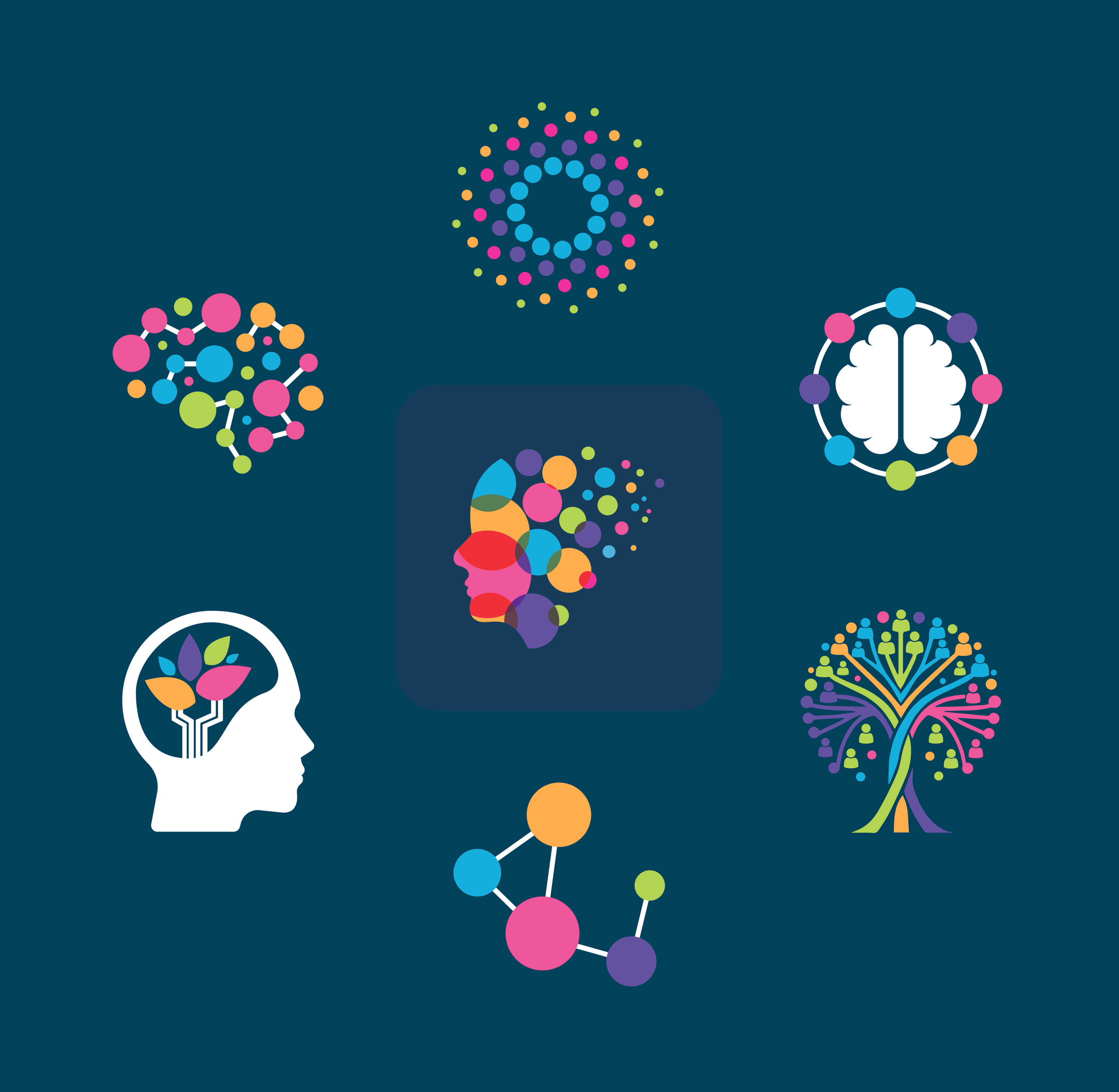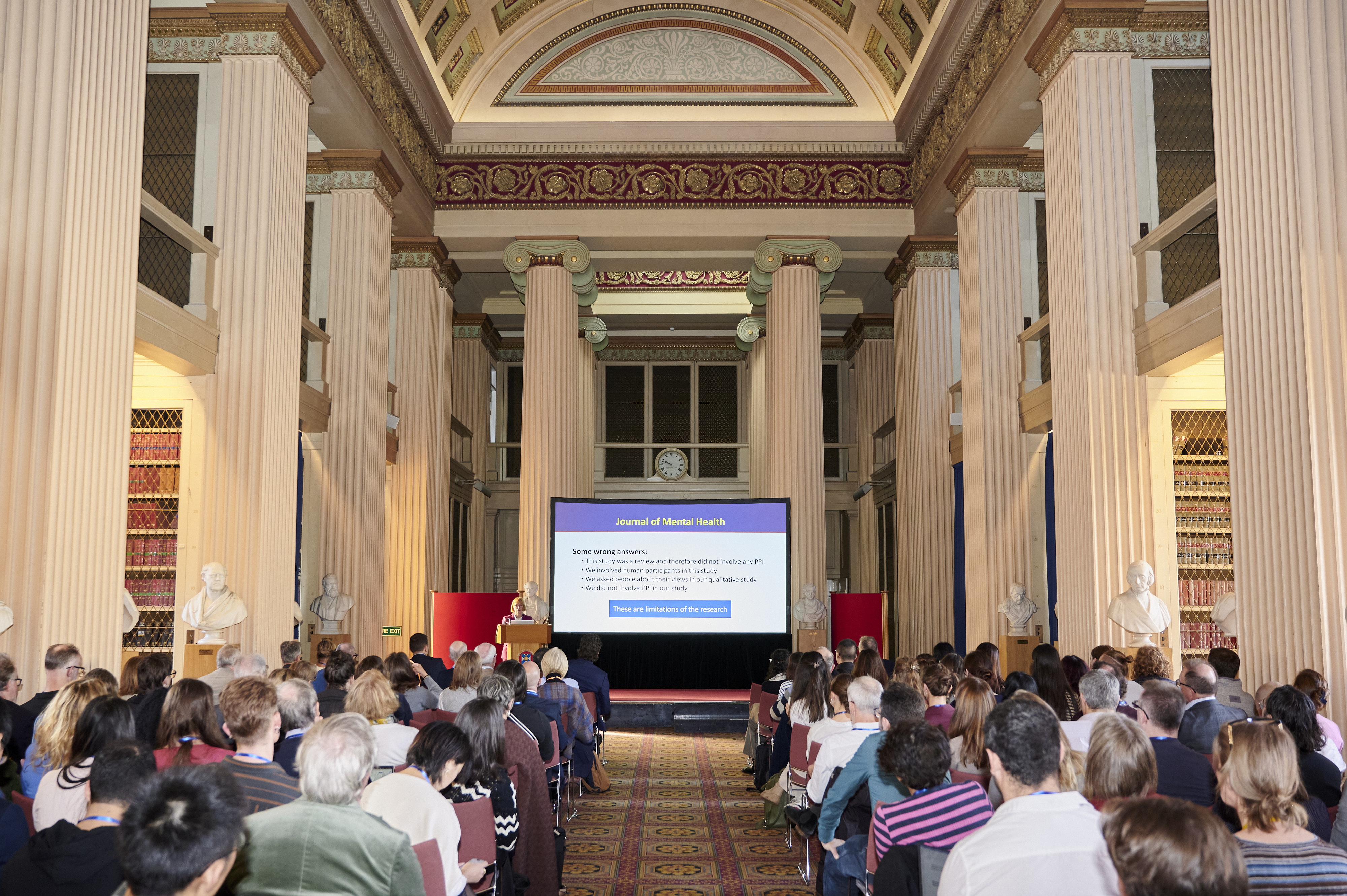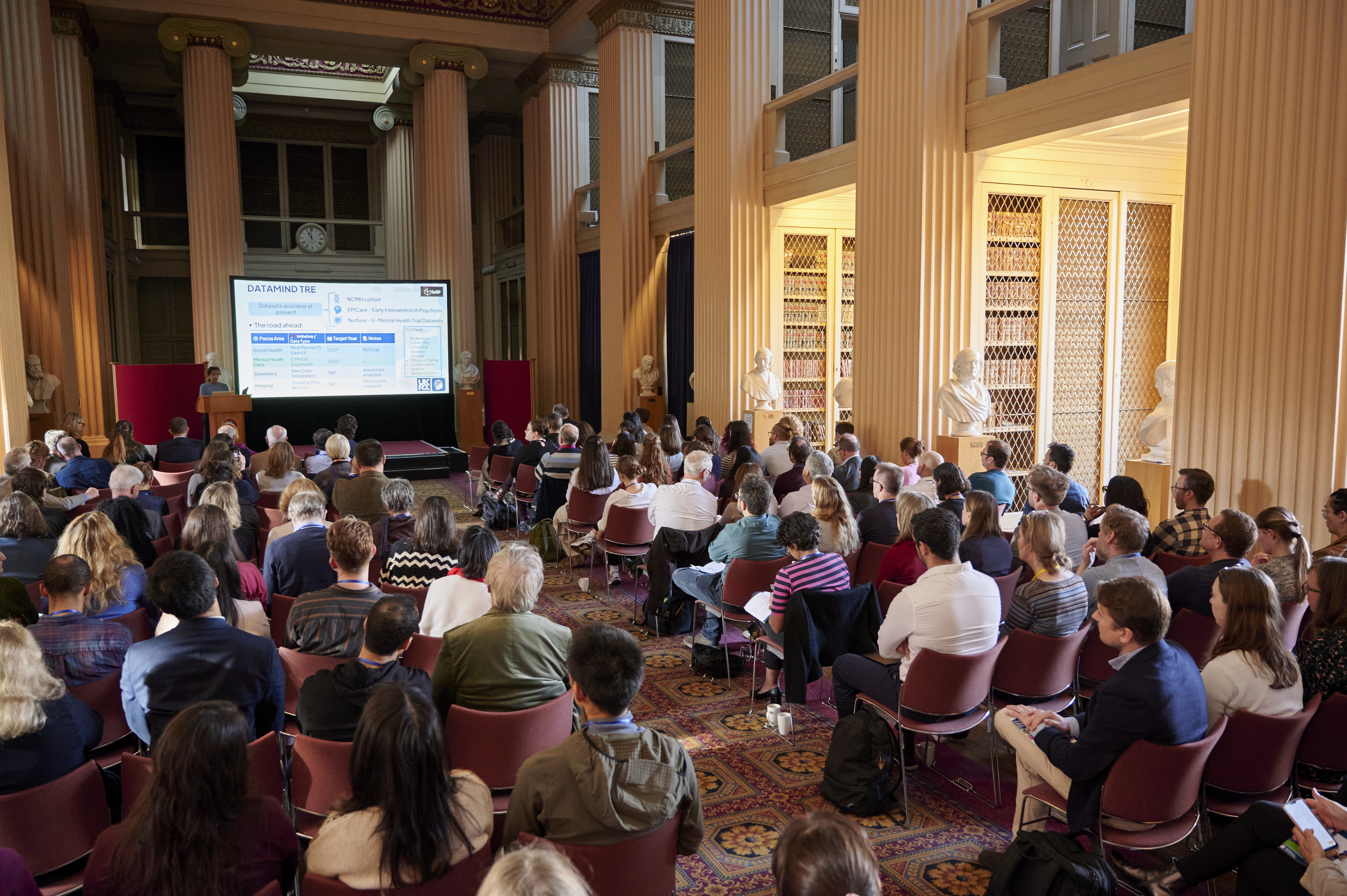8:45 - 9:20
Registration opens: coffee & pastries
Sign up to your preferred parallel sessions at registration - first come first served so make sure you don't miss out.
9:20 - 9:30
Welcome:
Professor Andrew McIntosh, MHP Director
9:30 - 10:00
Keynote:
Professor Dame Til Wykes
From Subjects to Participants to Co-production
Professor Dame Til Wykes, Head of School of Mental Health & Psychological Sciences, King’s College London

10:00 - 11:10
Core session 1: Mental Health Platform Hubs
15 minute talks + Q&A with our Hub Directors, who share the exciting research happening across the UK.
Professor James Walters, Brain and Genomics Hub
Professor Scott Weich, Complex Emotions Hub
Professors Ann John & Robert Stewart, DATAMIND

11:10 - 11:30
Break
Grab a tea or a coffee, and take a look at some posters

11:30 - 12:05
ECR Lightning Talks
Six 3-minute talks from ECRs. Selected from submitted abstracts, presenting research related to one of the three themes:
- Molecular Psychiatry
- Social and Emotional Health,
- Data, Digital & AI.

12:15 - 1:00
Parallel session 1
Each of these sessions are led by two of our Hubs in collaboration:
- Molecular Psychiatry led by ImmunoMIND and Metabolic Psychiatry
- Social & Emotional Health led by Complex Emotions and Social Health
- Data, Digital & AI led by DATAMIND and Brain & Genomics
We encourage delegates to participate in sessions from Hubs they aren’t members of to spark new connections and ideas.
You will be able to sign up for one of these three sessions at Registration. This is offered on a first-come first-served basis. Some of the rooms have limited seating so please arrive on time to ensure you can attend your preferred session.

Presentations and Q&A.
This session is led by two of our Hubs, Metabolic Psychiatry and ImmunoMIND, on the theme of Molecular Psychiatry. You can learn more about the projects central to the research, and have the opportunity to ask questions.
Metabolic Psychiatry
- 12:15 – 12:20 - Danny Smith (Edinburgh) - Overview of therapeutic prospects
- 12:20 – 12:25 - Jess Tyrell (Exeter) - Genomics project
- 12:25 – 12:30 - Caroline Jackson (Edinburgh) - Health Informatics project
ImmunoMIND
- 12:30 – 12:35 - Golam Khandaker (Bristol) - Overview of target triangulation
- 12:35 – 12:40 - Xueyi Shen (Edinburgh) - Proteomics of antidepressant drugs project
- 12:40 – 12:45 - Yuankai (Edward) He (Cambridge) - Genetics of brain structure and psych disorders project
Q&A, panel discussion
12:45 – 1:00 - Panel of all 6 speakers, chaired by Ed Bullmore, Cambridge (15 mins)
This session is led by two of our Hubs, Complex Emotions and Social Health, on the theme of Social and Emotional Health. You can learn more about the projects central to the research, and have the opportunity to ask questions.
Exploration of how social, neurobiological and psychological mechanisms co-act to contribute to mental wellbeing and illness.
This workshop will engage participants - with expertise from across academic disciplines and lived experience of receiving and delivering support - in identifying pressing research questions about underlying mechanisms and pathways linking social, neurobiological and psychological mechanisms within mental health and illness, particularly, how these generate health inequalities.
This session is led by two of our Hubs, Brain & Genomics and DATAMIND, on the theme of Data, Digital and AI. You can learn more about the projects central to the research, and have the opportunity to ask questions.
Chairs: A John, R Stewart
12:15 – 12:20: Ann John (Swansea University) Welcome and Session Overview from DATAMIND and B&G Hub
12:20 – 12:25: Robert Stewart (King’s College London). Health Research AI: The Importance of Having Adequate Data in the First Place.
There are huge opportunities in applied healthcare AI, but the models are only as good as the input they receive, depending largely on highly granular data from large samples. This is more challenging in mental health, but if we don’t achieve it, health inequalities will only widen further.
12:25 – 12:30: Sarah Markham (King’s College London) - PPI in AI-based Predictive Modelling
AI based predictive modelling has attracted much research interest, but systematic reviews have raised concerns about the quality of these models in certain areas. We will consider how PPI can reduce research waste and improve the quality and applicability of such models.
12:30 – 12:35: M Del Pozo Banos (Swansea University)- Five key challenges of AI in mental healthcare and research
AI promises to transform mental healthcare, but its integration must align with established epidemiology and clinical research practices. Hyper-dimensionality, sparsity, bias, interpretability and clinical relevance are five key challenges. By addressing these issues head-on, we can start building AI tools that are not only powerful but also safe, effective, and trustworthy.
12:35 – 12:40: Paul Jenkins (Warwick University). Prob_AI: Improving AI-based modelling through interdisciplinary collaborations
Probabilistic AI involves embedding probabilistic models, probabilistic reasoning, and measures of uncertainty within AI methods. The EPSRC-funded Prob_AI Hub aims to bring together researchers in Applied Mathematics, Probability, and Statistics to tackle challenges in probabilistic AI. Collaborations with the Mental Health Platform could be critical to build safer, fairer, and more reliable AI models for the mental health domain. These models could finally unite the inputs of clinicians, people with lived experience, and researchers, being able to turn uncertainties and metrics of confidence into core signals for decisions.
12:40 – 12:45: A Pardiñas (Cardiff University). AI readyness in the Brain and Genomics Hub and beyond
The Brain and Genomics Hub is gathering a large sample of people with psychosis, who are undertaking detailed research interviews, cognitive testing, and assessments such as bloods, genomics, and brain imaging. Each data modality that is being generated has its own best practices for curation and analysis, but future-proofing the resource includes ensuring its suitability, as a whole, for novel developments at the frontiers of generative and probabilistic AI. Through a consistent application of the FAIR principles, it is possible to generate multimodal datasets that are ready for newer generations of AI models, including agents with improved capabilities to interact with data.
12:45 – 1:00: General Discussion and Exploration of potential work and applications
1:00 - 1:45
Lunch, Posters, and an optional Edinburgh History Talk
Eat, network, and vote for your favourite poster for the People's Choice Award before joining Vaughn and Jess for a short talk where you can learn about Edinburgh - including history of psychiatry in the city!

1:45 - 2:55
Core session 2: Mental Health Platform Hubs
15 minute talks + Q&A with our Hub Directors, who share the exciting research happening across the UK.
Professor Ed Bullmore, ImmunoMIND Hub
Professor Daniel Smith, Metabolic Psychiatry Hub
Professor Jennifer Lau, Social Health Hub

3:00 - 4:00
Parallel session 2
Each of these sessions are led by partners of the MHP:
- Enriching Mental Health Research: Beyond Healthcare Data led by MQ & DATAMIND
- Reframing Priorities in Mental Health Drug Discovery: Challenges, Systemic Barriers, and Opportunities for Innovation led by Medicines Discovery Catapult
- The Power of Lived Experience in Mental Health Research led by MHP PPIE Steering Group and McPin Foundation
You will be able to sign up for one of these three sessions at Registration. This is offered on a first-come first-served basis. Some of the rooms have limited seating so please arrive on time to ensure you can attend your preferred session.

Panel discussion.
Enriching Mental Health Research: Beyond Healthcare Data
Meet the panel:
Dr Aideen Maguire, Reader Social Epidemiology / Director Administrative Data Research Centre Northern Ireland (ADRC NI)
Aideen is a Psychiatric Epidemiologist by training and a Reader in Social Epidemiology within the School of Medicine at Queen’s University Belfast. She is Director of the Administrative Data Research Centre Northern Ireland (ADRC NI), part of the larger UK-wide ADR UK consortia and runs the team of research specialists from Queen’s University Belfast and Ulster University who are focused on delivering high-quality and impactful evidence that supports policy and practice. The ADRC research portfolio includes work examining income, poverty, deprivation, education, air pollution, the built environment, children in care, homelessness, the justice system, self-harm, suicide, and mental ill-health. Aideen is a co-investigator with DATAMIND and leads up the NI team, utilising administrative data to better understand population mental health, with a particular focus on people in typically underserved groups
Dr Livia Araujo de Carvalho, Senior Lecturer in Psychoneuroimmunology and Co-Deputy Director of the Social Health Hub and Social Inequalities Cross-Hub Lead
Dr. Livia Carvalho is a Senior Lecturer in Clinical Pharmacology at the William Harvey Research Institute, Queen Mary University of London, and Director of the Translational Pharmacology Lab. Her research sits at the forefront of psychiatric neuroscience, aiming to uncover and validate cellular and immune mechanisms that drive major psychiatric disorders - particularly treatment-resistant depression. Her lab integrates epidemiological data, clinical cohorts, and clinical trials to identify actionable targets for diagnosis and intervention.
Driven by a translational vision, Dr. Carvalho bridges neuroscience and psychiatry to reimagine how mental illness is understood and treated. Her research also explores how social and biological factors interact to shape mental health outcomes, with a focus on multimorbidity, early detection or prevention of cardiometabolic diseases. She leverages both novel and routine clinical data to power precision health research.
Her work is currently funded by UKRI, Barts Charity, and the Wellcome Trust. She also serves on the Editorial Boards of Brain, Behavior, and Immunity and the Journal of Psychosomatic Research.
Dr Robin Flaig, Co-Director at UK Longitudinal Linkage Collaboration (UK LLC) and Operations Manager with Generation Scotland
Robin is the Co-Director at UK LLC and holds strategic responsibility for applications, communications, public involvement and Scottish data linkages. Robin has been with the University of Edinburgh for over 20 years and has extensive experience working with Longitudinal Population Studies and data linkage. Robin’s previous role as a Programme Manager with UK BioBank and now as Operations Manager with Generation Scotland has allowed her to understand the complexities around linking Longitudinal Population Study data across the four nations. Prior to working with data linkage, Robin was the Audit Coordinator for the Scottish Stroke Care Audit working to improve the care of patients who have suffered a stroke.
Michael McTernan, Lived Experience Expert DATAMIND & Mental Health Platform.
Michael is a passionate advocate for accessible mental health support, drawing on his own lived experience to help deliver services that meet the needs of people affected by mental health issues. As a lived experience expert for DATAMIND and The Mental Health Platform, he applies his insights to advance mental health initiatives.
An expert in digital health and AI, Michael was the CEO and founder of UB-OK, collaborating with NHS Grampian to make mental health support more accessible, engaging, and transformative for young people.
With over 20 years senior management experience Michael provides strategic advice, supporting startups in the UK and Europe.
In addition to his work in digital health, Michael is a registered member of the British Association for Counselling and Psychotherapy (BACP) a specialist in ADHD and he works part-time as a psychotherapist for the affordable counselling service, CoCo Counselling in the Community.
Suitable for anyone interested in how to data science can be used to develop their research.
Panel Discussion.
Reframing Priorities in Mental Health Drug Discovery: Challenges, Systemic Barriers, and Opportunities for Innovation
The development of new treatments for psychiatric disorders has historically lagged behind other therapeutic areas, despite the immense burden of mental health conditions worldwide. Slow progress reflects a combination of scientific hurdles, such as limited mechanistic understanding, poor translatability of preclinical models, and high attrition rates, as well as systemic barriers that undermine confidence in the field. Negative trial results not only stall individual programmes but also erode broader credibility and investor confidence. At the same time, a cautious risk appetite across academia, industry, and funders constrains exploration of novel approaches.
This panel will convene experts from across the sector to map the current mental health drug discovery landscape through a priority-setting lens. The discussion will explore:
- Scientific and systemic reasons for stalled progress, including mechanistic blind spots, lack of preclinical-to-clinical rationale and cultural disincentives
- Priority areas for innovation, from novel targets and translational tools to embedding lived experience
- Pathways to accelerate discovery, including learning from abandoned drug programmes, harnessing data to inform future research, and utilising strategies for repurposing existing drugs alongside novel approaches
- Partnership and collaboration models that can facilitate progress, share risk, and enable more integrated approaches to discovery and translation.
- The incentive structures needed to attract sustained investment and risk-taking, including financial, regulatory, cultural, and patient-centric drivers.
By surfacing unmet needs, systemic barriers, and pragmatic opportunities, this session will generate collective insights into how to realign priorities, rebuild confidence, and reinvigorate mental health drug discovery.
Suitable for anyone curious about the role Industry can play in finding new treatments for people with SMI.
Panel Discussion.
The Power of Lived Experience in Mental Health Research
Curious about how and why Public and Patient Involvement and Engagement (PPIE) is shaping the future of mental health research? This session is perfect for anyone passionate about research impact, especially Early Career Researchers (ECRs) who want to learn how to do it well.
Designed and led by our Mental Health Platform PPIE Steering Group in collaboration with the McPin Foundation, this dynamic panel will explore an often-overlooked topic: the positive aspects of lived experience and how they can transform the way we approach research.
Expect thought-provoking discussion as the panel tackles key questions like:
- What is the true goal of PPIE in mental health research?
- Why do people with lived experience choose to get involved – and what do they hope to achieve?
- How can these unique perspectives make research richer, more relevant, and more impactful?
At MHP we integrate PPIE across all our work. Whether you’re new to this approach or looking to strengthen your practice, this session will leave you inspired and equipped with fresh ideas.
Suitable for anyone interested in how and why PPIE is important in mental health research, especially ECRs.
4:00 - 4:15
Break
Last chance to vote for your favourite poster for the People's Choice Award

4:15 - 4:45
Keynote:
Professor Paul Harrison
From big data to biology: cognitive impairment after COVID-19 infection
Professor Paul Harrison, Professor of Psychiatry Associate Head of Department (Research) University of Oxford

4:45 - 5:00
Prizegiving and Closing Remarks

MHP Research Summit Hot Topic: Collaboration

MHP Research Summit Hot Topic: PPIE


